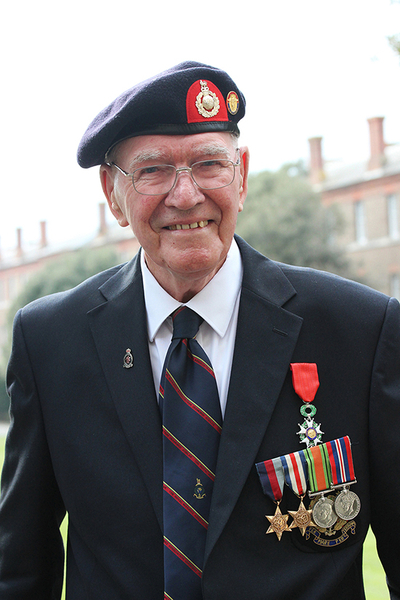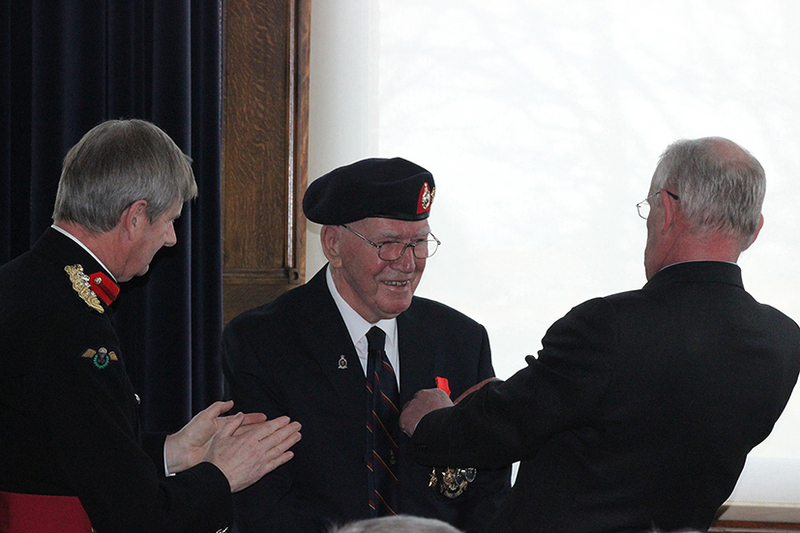D-Day veteran awarded highest French honour
THERE was a tear in his eye as the award was pinned to his chest. Waterlooville churchgoer and D-Day veteran Ted Turner was thinking of those who didn't make it.

Ted Turner with his Legion d'Honneur

Ted is presented with the award by Captain Francois Jean
The 89-year-old, who goes to St John’s Church, Purbrook, was awarded the Legion d’Honneur by the French government at a ceremony at the Royal Marines Museum in Southsea.
He was among the first D-Day veterans in the country to be given the award, and the first from the Portsmouth area. The Legion d’Honneur was originally created by Napoleon Bonaparte and is the highest decoration in France.
As an 18-year-old Royal Marine, Ted helped Canadian troops secure a beachhead on Juno beach in the decisive invasion of France in June 1944. He had sailed across the English Channel in a tiny landing craft with the Allied fleet, as part of the largest seaborne invasion in history.
Ted received his award from Captain Francois Jean, the Consul Honoraire of France, on behalf of French president Francois Hollande.
Capt Jean said: "My own father was in a concentration camp in Germany, and June 6, 1944, was the first step in the liberation of France and the release of those prisoners. It was down to these men, to their commitment, their sacrifice, that these women and men in Germany and France were liberated. It is a great honour for me to present the Legion d'Honnaire on behalf of the president of France to you, Ted Turner."
As Capt Jean pinned the medal to his chest, a team of buglers played a fanfare. Dignitaries and invited guests broke into warm applause. Ted's thoughts were initially with those who never made it back from the Normandy beaches after D-Day before his beaming smile returned.
Ted Turner said: "I'm accepting this on behalf of all those who never came back from the Normandy beaches. I think of them often. We spent 24 hours a day together, so we were like brothers.
"Today I was very proud, but also a bit teary. It's an honour to receive an award that started with Napoleon."
For more photos from the ceremony, click here.
The ceremony had been introduced by the Deputy Lord Lieutenant of Hampshire, Colonel Charles Ackroyd, on behalf of the Queen. Also present was the Lord Mayor of Portsmouth, Cllr Steven Wyllie; and the president of the D-Day and Normandy Fellowship, Vice-Admiral Sir Geoffrey Dalton.
Former Pompey players Alan Knight and Ray Crawford were there, along with current Pompey FC chairman Iain McInnes, to reflect Ted’s passion for Portsmouth FC. The vicar of St John’s Church, Purbrook, the Rev Connie Sherman, and associate priest the Rev Julie Jones, led a group from his church.
“My faith has been very important to me over the years, and of course there were lots of prayers said on those days around D-Day," said Ted. "God has helped me in lots of other situations too, especially when my wife Enid died five years ago. My friends at St John’s Church mean a lot to me, and I’m glad many of them were there for this presentation.”
The French government informed the UK Ministry of Defence last year that it wanted to recognise the selfless acts of heroism displayed by surviving veterans of the Normandy landings and the campaign to liberate France in 1944, by awarding them the Legion d’Honneur. Veterans were invited to apply for the award, and a handful of presentations have already taken place around the UK.
Ted Turner was born and brought up in Hilsea, Portsmouth, and attended St Francis Church. At 17 he decided to go to Portsmouth’s recruiting office and sign up for the RAF, but he was too young. Instead he was taken on by the Royal Marines in January 1943.
He was stationed at Eastney Barracks and then at Fort Gomer in Gosport. His training included time in North Wales, Great Yarmouth and in Dartmouth where he spent six weeks learning how to use a landing craft and basic seamanship.
He and three other colleagues then manned a landing craft which was based at Itchenor, near Chichester. On June 4, 1944, they sailed across to Lee-on-Solent and came alongside a Canadian troop ship. And on June 5, they sailed across the Channel in their landing craft as part of the invasion.
Seven miles off the French coast, the Canadian engineers and their trailer came on board their landing craft, and Ted and his colleagues inched towards Juno Beach near Courseulles-sur-Mer.
“It was very quiet, no one spoke,” said Ted. “Then when we got close to the beach, the Germans started firing and it was pretty noisy. I was used to it, as my dad had been in charge of the Firewatch in Portsmouth, so I’d heard air raids and gunfire anyway.
“I wasn’t frightened. I was only young, so it felt a bit like an adventure to me, even at that stage. We landed the Canadian engineers and their equipment on the beach and then backed off, so we could see what was going on. Some landing craft were hit and started sinking, some Canadians were being shot around us.
“We slept on the beach that night, and I remember a German plane coming over and flying very low. We were all firing at it. The next day, we started unloading all the ships by landing craft. Most of the boxes we unloaded seemed to be food.
“The next day, the Canadians dug a trench for the dead bodies and covered them over. But we saw a few bodies still floating on the tide, even a week after D-Day.”
Ted stayed in Normandy for six weeks before he was picked up by a ship and returned to the UK. Some of his colleagues decided to sail landing craft back across the Channel, but hit rough seas and bad weather. Thirty of them were drowned.
Ted campaigned to get a plaque placed at their former camp in Bracklesham Bay to remember their loss. It was erected there on June 3 last year. Ted then spent a night at the camp – leaving on June 4, 70 years to the day since he left the same camp for the D-Day invasion.
Ted also served in Germany, Sri Lanka, Hong Kong and Japan after the end of the war. He remembers sailing past Hiroshima after the atomic bomb had been dropped and seeing the devastation it had wrought.